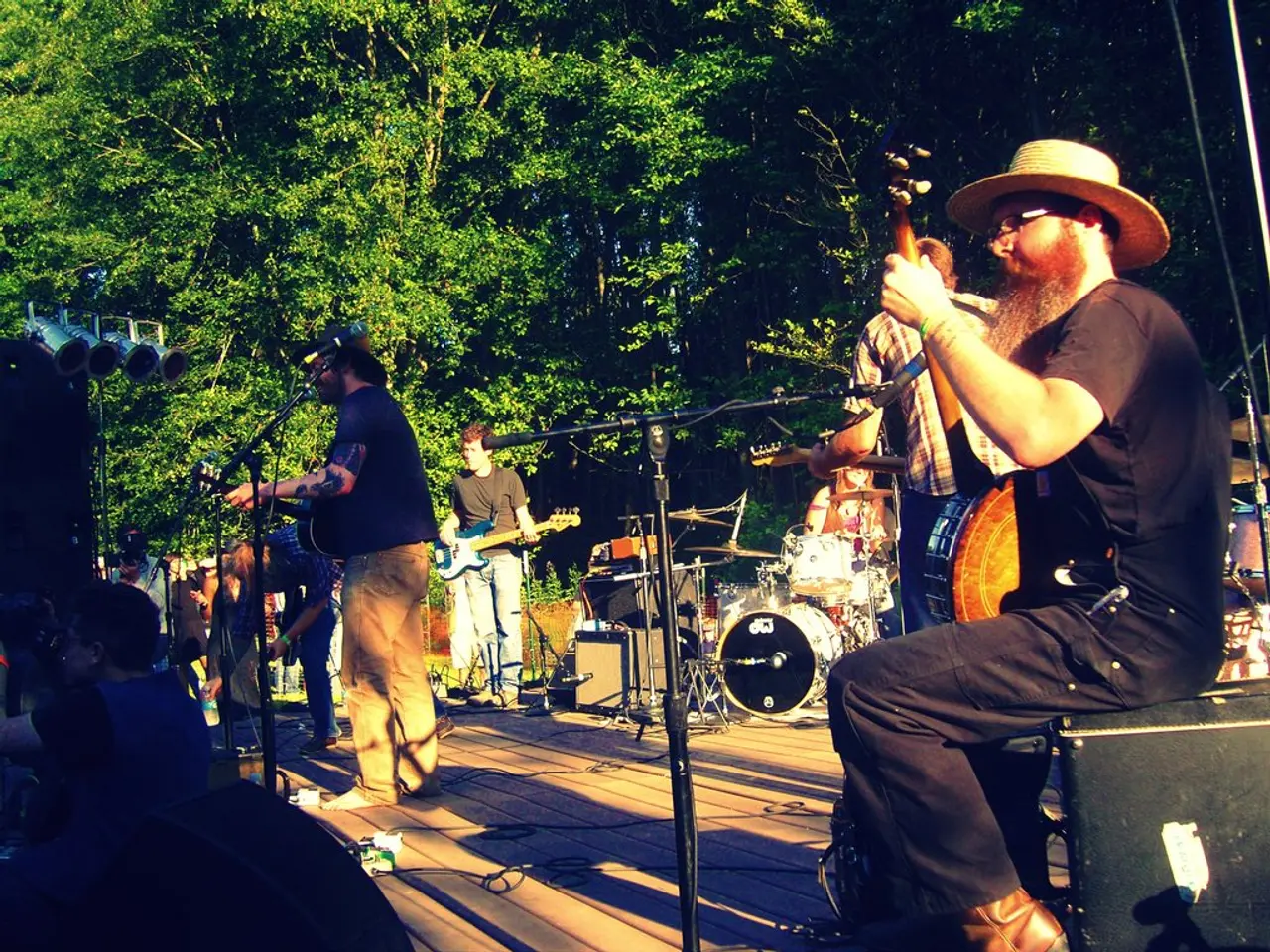Investigating the Brain's Varied Reactions to Distinct Types of Music
==================================================================
In the realm of human experience, music has long been a source of joy, solace, and inspiration. But did you know that various musical genres can stimulate different parts of our brains, influencing our emotions, cognition, and overall well-being?
Research suggests that our brains respond differently to classical, jazz, rock, pop, electronic, ambient, country, and folk music. These responses are rooted in the unique ways each genre activates pleasure, prediction, emotional regulation, and familiarity circuits in our brains.
Classical music, with its complex structures and subtle variations, appeals to listeners who appreciate intricate and layered soundscapes. Studies indicate that classical music listeners tend to enjoy predictability with nuanced surprises, engaging learning and pleasure circuits deeply.
Jazz, characterised by high unpredictability and improvisation, challenges the brain's predictive processing systems, often leading to strong engagement from listeners who enjoy complexity and novelty.
Rock and pop music, on the other hand, often have more predictable rhythmic and melodic structures. These genres stimulate the motor cortex, encouraging movement and physical responses to the beat. They also activate emotional centres like the amygdala, influencing mood and emotional regulation.
Electronic music and ambient music offer unique experiences, with repetitive beats and layered synthetic textures that can induce trance-like states, supporting focus and movement. For some, they provide an innovative soundscape that attracts listeners seeking originality and experimental elements.
Country and folk music tend to contain culturally familiar and narrative-driven elements, activating memory and social processing areas of the brain. These genres are closely tied to cultural identity, helping listeners connect emotionally through shared musical traditions and storytelling.
Country music has a strong connection to memory and nostalgia, evoking personal memories and a sense of longing or nostalgia. In individuals with memory impairments, country music's often reflective lyrics and familiar melodies can help recall forgotten memories.
Folk music fosters a sense of community and belonging, which is essential for mental health and well-being. Its communal nature can enhance social cognition skills, such as empathy, cooperation, and understanding of social cues.
Rock and pop music plays a significant role in social and cultural identity formation. Its lyrical content can resonate deeply with listeners, allowing emotional connection and a more profound impact on mood and mental state.
Electronic and ambient music are increasingly being recognised for their therapeutic potential. They promote relaxation and sleep, enhance mood in people with depressive symptoms, and are being used to treat anxiety and stress-related disorders.
In conclusion, the brain's reward system responds strongly to music that balances predictability and surprise. However, individual differences exist, and some people may show reduced response, such as those with musical anhedonia.
Each genre offers a unique experience, evoking diverse responses based on the music's complexity, cultural familiarity, and individual listener preferences and neural sensitivity to predictability and novelty. Whether you prefer the rhythmic beats of rock and pop, the complex structures of classical music, the improvisation of jazz, the innovative soundscapes of electronic music, the nostalgic tunes of country and folk, or the calming ambience of ambient music, there's a genre for everyone to enjoy and benefit from.
- Neuroscience reveals that our brains respond differently to various musical genres, impacting emotions, cognition, and overall well-being.
- Classical music, known for its intricate structure and nuanced variations, stimulates learning and pleasure circuits in the brain.
- Jazz, with its high unpredictability and improvisation, challenges the brain's predictive processing systems, leading to strong engagement.
- Rock and pop music, with predictable rhythmic and melodic structures, stimulate the motor cortex, encouraging movement, and activating emotional centers like the amyggdala.
- Electronic and ambient music induce trance-like states, supporting focus, movement, and promoting relaxation and sleep.
- Country and folk music activate memory and social processing areas of the brain, connecting listeners emotionally through shared musical traditions and narrative-driven lyrics.
- Country music evokes personal memories and a sense of nostalgia, helping individuals with memory impairments recall forgotten memories.
- Folk music enhances social cognition skills, such as empathy, cooperation, and understanding of social cues, fostering a sense of community and belonging.
- Rock and pop music plays a significant role in social and cultural identity formation.
- Electronic and ambient music are increasingly used for therapeutic purposes, treating anxiety and stress-related disorders.
- The brain's reward system responds strongly to music that balances predictability and surprise, but individual differences exist, such as those with musical anhedonia.
- Each musical genre provides a unique experience, evoking diverse responses based on the music's complexity, cultural familiarity, and individual listener preferences and neural sensitivity to predictability and novelty.
- Music can stimulate different brain networks associated with attention, memory, emotional intelligence, and mental health.
- Proper nutrition, regular exercise, mental-health practices like meditation, adequate sleep, and engaging in health-and-wellness activities contribute to brain health and enhanced cognitive performance.




